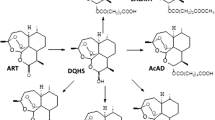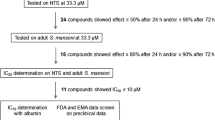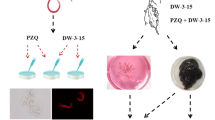Abstract
Schistosomiasis caused by different species of schistosome parasites is one of the most debilitating helminthic diseases of humans worldwide. For decades, chemotherapy is the main method of controlling schistosomiasis. However, the fear of drug resistance has motivated the search for alternatives. It has been demonstrated that the ABL kinase inhibitor imatinib affected the development and survival of Schistosoma mansoni in vitro; however, there is still lack of information on whether imatinib also affects other schistosome species such as Schistosoma japonicum. In the present study, the anti-schistosomal potency of imatinib on adult S. japonicum was investigated in vitro, and the results showed that imatinib had a significant impact on various physiological processes of S. japonicum adult worms. Besides its negative effects on worm motility, pairing stability, and gonad development, imatinib caused pathological changes in the gastrodermis as well as the death of the parasite. Our findings suggest that imatinib is an intriguing candidate for further development as an option to fight S. japonicum.





Similar content being viewed by others
Abbreviations
- PZQ:
-
Praziquantel
- S. japonicum :
-
Schistosoma japonicum
- S. mansoni :
-
Schistosoma mansoni
- PTKs:
-
Protein tyrosine kinases
- ABL:
-
Abelson
- CML:
-
Chronic myelogenous leukemia
- cKIT:
-
Proto-oncogene receptor tyrosine kinase
- PDGF-R:
-
Platelet-derived growth factor receptors
- Imatinib:
-
Imatinib mesylate
- CLSM:
-
Confocal laser scanning microscopy
References
Abdulla MH, Ruelas DS, Wolff B, Snedecor J, Lim KC, Xu F, Renslo AR (2009) Drug discovery for schistosomiasis: hit and lead compounds identified in a library of known drugs by medium-throughput phenotypic screening. PLoS Negl Trop Dis 3(7):e478. https://doi.org/10.1371/journal.pntd.0000478
Andrews P, Thomas H, Pohlke R, Seubert J (1983) Praziquantel. Med Res Rev 3(2):147–200
Ardito F, Giuliani M, Perrone D, Troiano G, Lo Muzio L (2017) The crucial role of protein phosphorylation in cell signaling and its use as targeted therapy (review). In J Mol Med 40:271–280. https://doi.org/10.3892/ijmm.2017.3036
Beckmann S (2012) Protein kinases as potential targets for novel anti-schistosomal strategies. Curr Pharm Des 18(24):3579–3594
Beckmann S, Grevelding CG (2010) Imatinib has a fatal impact on morphology, pairing stability and survival of adult Schistosoma mansoni in vitro. Int J Parasitol 40(5):521–526. https://doi.org/10.1016/j.ijpara.2010.01.007
Beckmann S, Quack T, Burmeister C, Buro C, Long T, Dissous C, Grevelding CG (2010) Schistosoma mansoni: signal transduction processes during the development of the reproductive organs. Parasitol 137(03):497
Beckmann S, Hahnel S, Cailliau K, Vanderstraete M, Browaeys E, Dissous C, Grevelding CG (2011) Characterization of the Src/Abl hybrid kinase SmTK6 of Schistosoma mansoni. J Biol Chem 286(49):42325–42336. https://doi.org/10.1074/jbc.M110.210336
Beckmann S, Long T, Scheld C, Geyer R, Caffrey C, Grevelding CG (2014) Serum albumin and α-1 acid glycoprotein impede the killing of Schistosoma mansoni by the tyrosine kinase inhibitor imatinib. Int J Parasitol Drugs Drug Resist 4(3):287–295. https://doi.org/10.1016/j.ijpddr.2014.07.005
Bergquist R, Utzinger J, Keiser J (2017) Controlling schistosomiasis with praziquantel: how much longer without a viable alternative? Infect Dis Poverty 6(1):74–83. https://doi.org/10.1186/s40249-017-0286-2
Berriman M, Haas BJ, LoVerde PT, Wilson RA, Dillon GP, Cerqueira GC, Mashiyama ST (2009) The genome of the blood fluke Schistosoma mansoni. Nature 460(7253):352–358. https://doi.org/10.1038/nature08160
Buchdunger E, O’Reilly T, Wood J (2002) Pharmacology of imatinib (STI571). Eur J Cancer Suppl 5:S28–S36
Buro C, Beckmann S, Oliveira KC, Dissous C, Cailliau K, Grevelding CG (2014) Imatinib treatment causes substantial transcriptional changes in adult Schistosoma mansoni in vitro exhibiting pleiotropic effects. PLoS Negl Trop Dis 8(6):e2923. https://doi.org/10.1371/journal.pntd.0002923
Cheever AW, Powers KG (1969) Schistosoma mansoni infection in rhesus monkeys: changes in egg production and egg distribution in prolonged infections in intact and splenectomized monkeys. Ann Trop Med Parasitol 63(1):83–93
Cheever AW, Macedonia JG, Mosimann JE, Cheever EA (1994) Kinetics of egg production and egg excretion by Schistosoma mansoni and S. japonicum in mice infected with a single pair of worms. Am J Trop Med Hyg 50(3):281–295
Deininger MW, Goldman JM, Melo JV (2000) The molecular biology of chronic myeloid leukemia. Blood 96(10):3343–3356
Dissous C, Ahier A, Khayath N (2007) Protein tyrosine kinases as new potential targets against human schistosomiasis. BioEssays 29(12):1281–1288. https://doi.org/10.1002/bies.20662
Doenhoff MJ, Pica-Mattoccia L (2006) Praziquantel for the treatment of schistosomiasis: its use for control in areas with endemic disease and prospects for drug resistance. Expert Rev Anti-Infect Ther 4(2):199–210. https://doi.org/10.1586/14787210.4.2.199
El-Agamy DS, Shebl AM, Said SA (2011) Prevention and treatment of Schistosoma mansoni-induced liver fibrosis in mice. Inflammopharmacology 19(6):307–316. https://doi.org/10.1007/s10787-011-0092-6
Goswami D, Gurule S, Lahiry A, Anand A, Khuroo A, Monif T (2016) Clinical development of imatinib: an anticancer drug. Future Sci OA 2(1):Fso92. https://doi.org/10.4155/fso.15.92
Grover JK, Vats V, Uppal G, Yadav S (2001) Anthelmintics: a review. Trop Gastroenterol 22(4):180–189
Han ZG, Brindley PJ, Wang SY, Chen Z (2009) Schistosoma genomics: new perspectives on schistosome biology and host-parasite interaction. Annu Rev Genomics Hum Genet 10:211–240. https://doi.org/10.1146/annurev-genom-082908-150036
Harder A (2002) Chemotherapeutic approaches to schistosomes: current knowledge and outlook. Parasitol Res 88(5):395–397
Hemer S, Brehm K (2012) In vitro efficacy of the anticancer drug imatinib on Echinococcus multilocularis larvae. Int J Antimicrob Agents 40(5):458–462. https://doi.org/10.1016/j.ijantimicag.2012.07.007
Hess J, Keiser J, Gasser G (2015) Toward organometallic antischistosomal drug candidates. Future Med Chem 7(6):821–830. https://doi.org/10.4155/fmc.15.22
Hubbard SR, Miller WT (2007) Receptor tyrosine kinases: mechanisms of activation and signaling. Curr Opin Cell Biol 19:117–123. https://doi.org/10.1016/j.ceb.2007.02.010
Hubbard SR, Till JH (2000) Protein tyrosine kinase structure and function. Annu Rev Biochem 69:373–398. https://doi.org/10.1146/annurev.biochem.69.1.373
Ishizawar R, Parsons SJ (2004) c-Src and cooperating partners in human cancer. Cancer Cell 6(3):209–214. https://doi.org/10.1016/j.ccr.2004.09.001
Knobloch J, Beckmann S, Burmeister C, Quack T, Grevelding CG (2007) Tyrosine kinase and cooperative TGFbeta signaling in the reproductive organs of Schistosoma mansoni. Exp Parasitol 117(3):318–336. https://doi.org/10.1016/j.exppara.2007.04.006
Kovac J, Vargas M, Keiser J (2017) In vitro and in vivo activity of R- and S- praziquantel enantiomers and the main human metabolite trans-4-hydroxy-praziquantel against Schistosoma haematobium. Parasit Vectors 10(1):365–366. https://doi.org/10.1186/s13071-017-2293-3
Larson RA, Druker BJ, Guilhot F, O’Brien SG, Riviere GJ, Krahnke T (2008) Imatinib pharmacokinetics and its correlation with response and safety in chronic-phase chronic myeloid leukemia: a subanalysis of the IRIS study. Blood 111(8):4022–4028. https://doi.org/10.1182/blood-2007-10-116475
Lewis FA, Tucker MS (2014) Schistosomiasis. Adv Exp Med Biol 766:47–75. https://doi.org/10.1007/978-1-4939-0915-5_3
Manley PW, Cowan-Jacob SW, Buchdunger E, Fabbro D, Fendrich G (2002) Imatinib: a selective tyrosine kinase inhibitor. Eur J Cancer 38(Suppl 5):S19–S27
Neves RH, de Lamare Biolchini C, Machado-Silva JR, Carvalho JJ (2005) A new description of the reproductive system of Schistosoma mansoni (Trematoda: Schistosomatidae) analyzed by confocal laser scanning microscopy. Parasitol Res 95(1):43–49. https://doi.org/10.1007/s00436-004-1241-2
O’Connell EM, Bennuru S, Steel C, Dolan MA, Nutman TB (2015) Targeting filarial Abl-like hinases: orally available, food and drug administration-approved tyrosine kinase inhibitors are microfilaricidal and macrofilaricidal. J Infect Dis 212(5):684–693. https://doi.org/10.1093/infdis/jiv065
O’Connell EM, Kamenyeva O, Lustigman S, Bell A, Nutman TB (2017) Defining the target and the effect of imatinib on the filarial c-Abl homologue. PLoS Negl Trop Dis 11(7):e0005690. https://doi.org/10.1371/journal.pntd.0005690
Pathak V, Colah R, Ghosh K (2015) Tyrosine kinase inhibitors: new class of antimalarials on the horizon? Blood Cells Mol Dis 55(2):119–126. https://doi.org/10.1016/j.bcmd.2015.05.007
Pendergast AM (2002) The Abl family kinases: mechanisms of regulation and signaling. Adv Cancer Res 85:51–100
Pica-Mattoccia L, Cioli D (2004) Sex- and stage-related sensitivity of Schistosoma mansoni to in vivo and in vitro praziquantel treatment. Int J Parasitol 34(4):527–533. https://doi.org/10.1016/j.ijpara.2003.12.003
Pica-Mattoccia L, Doenhoff MJ, Valle C, Basso A, Troiani AR (2009) Genetic analysis of decreased praziquantel sensitivity in a laboratory strain of Schistosoma mansoni. Acta Trop 111(1):82–85. https://doi.org/10.1016/j.actatropica.2009.01.012
Rossari F, Minutolo F, Orciuolo E (2018) Past, present, and future of Bcr-Abl inhibitors: from chemical development to clinical efficacy. J Hematol Oncol 11(1):84–97. https://doi.org/10.1186/s13045-018-0624-2
Thetiot-Laurent SA, Boissier J, Robert A, Meunier B (2013) Schistosomiasis chemotherapy. Angew Chem Int Ed Eng 52(31):7936–7956. https://doi.org/10.1002/anie.201208390
Townson S, Ramirez B, Fakorede F, Mouries MA, Nwaka S (2007) Challenges in drug discovery for novel antifilarials. Expert Opin Drug Discovery 2(s1):S63–S73. https://doi.org/10.1517/17460441.2.S1.S63
Wang J, Li Y, Zhou SL (1987) An observation of praziquantel effecting on the activity and survival of hepatic-portal-phase Schistosomulae of Schistosoma japonicum in vitro. Acta AcadMed Hebei 18:338–342 [in Chinese]
Wang W, Dai JR, Li HJ, Shen XH, Liang YS (2010) Is there reduced susceptibility to praziquantel in Schistosoma japonicum? Evidence from China. Parasitology 137(13):1905–1912. https://doi.org/10.1017/S0031182010001204
Webbe G, James C (1977) A comparison of the susceptibility to praziquantel of Schistosoma haematobium, S. japonicum, S. mansoni, S. intercalatum and S. mattheei in hamsters. Z Parasitenkd 52(2):169–177
Weeks JC, Roberts WM, Leasure C, Suzuki BM, Robinson KJ (2018) Sertraline, paroxetine, and chlorpromazine are rapidly acting anthelmintic drugs capable of clinical repurposing. Sci Rep 8(1):975–990. https://doi.org/10.1038/s41598-017-18457-w
WHO (2017) Schistosomiasis and soil-transmitted helminthiases: number of people treated in 2016. Wkly Epidemiol Rec 92(49):749–760
Wu S, Fu L (2018) Tyrosine kinase inhibitors enhanced the efficacy of conventional chemotherapeutic agent in multidrug resistant cancer cells. Mol Cancer 17(1):25–37. https://doi.org/10.1186/s12943-018-0775-3
Xiao SH, Sun J, Xue J (2012) Confocal laser scanning microscopic observation on adult Schistosoma japonicum harbored in mice following treatment with single-dose mefloquine. Parasitol Res 110(6):2403–2411. https://doi.org/10.1007/s00436-011-2779-4
Xu LL, Jiang B, Duan JH, Zhuang SF, Liu YC, Zhu SQ (2014) Efficacy and safety of praziquantel, tribendimidine and mebendazole in patients with co-infection of Clonorchis sinensis and other helminths. PLoS Negl Trop Dis 8(8):e3046. https://doi.org/10.1371/journal.pntd.0003046
Ye Q, Dong HF, Grevelding CG, Hu M (2013) In vitro cultivation of Schistosoma japonicum-parasites and cells. Biotechnol Adv 31(8):1722–1737. https://doi.org/10.1016/j.biotechadv.2013.09.003
Funding
This work was supported by grants from the National Key Basic Research Program (973 program) of China (grant no. 2015CB150300) and the Fundamental Research Funds for the Central Universities (grant no. 2662017PY084) to MH and the Huazhong Agricultural University Scientific & Technological Self Innovation Foundation (Program no. 2015RC005) to MH, RF, YQZ, and JLZ.
Author information
Authors and Affiliations
Contributions
Conceived and designed the experiments: SH, CGG, and MH. Performed the experiments: XS, LZ, MM, TZ, and LL. Analyzed the data: XS, SH, LZ, CGG, and MH. Contributed reagents/materials/analysis tools: RF, YQZ, and JLZ. Wrote the paper: XS, SH, LZ, CGG, and MH. All authors read and approved the final manuscript.
Corresponding author
Ethics declarations
Ethical approval and consent to participate
The conduct and procedures involving animal experimentation in this study were approved by the Scientific Ethics Committee of Huazhong Agricultural University (HZAUMO-2017-024) according to the regulations for the Administration of Affairs Concerning Experimental Animals of Hubei Province.
Conflict of interests
The authors declare that they have no competing interests.
Additional information
Section Editor: Ramaswamy Kalyanasundaram
Publisher’s note
Springer Nature remains neutral with regard to jurisdictional claims in published maps and institutional affiliations.
Rights and permissions
About this article
Cite this article
Li, X., Haeberlein, S., Zhao, L. et al. The ABL kinase inhibitor imatinib causes phenotypic changes and lethality in adult Schistosoma japonicum. Parasitol Res 118, 881–890 (2019). https://doi.org/10.1007/s00436-019-06224-x
Received:
Accepted:
Published:
Issue Date:
DOI: https://doi.org/10.1007/s00436-019-06224-x




